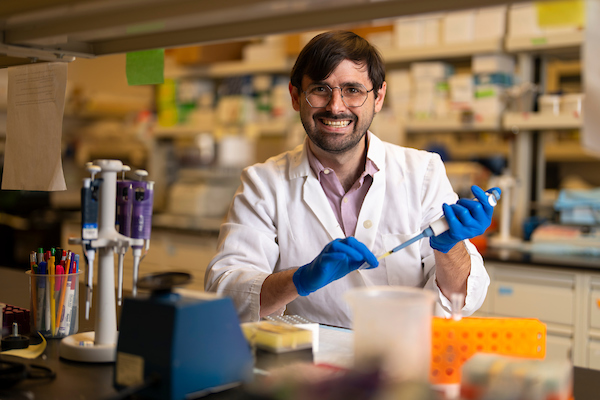New faculty member brings research on aging to Department of Nutrition
Hastings will investigate interventions to increase human ‘health span’
Waylon Hastings ’15, Ph.D., has returned to his alma mater as an assistant professor in Texas A&M’s College of Agriculture and Life Sciences Department of Nutrition with a mission to develop efficient methods to measure individual differences in aging.

Hastings, who began Aug. 1, earned undergraduate degrees in biochemistry, genetics and mathematics, as well as a master’s degree in educational administration from Texas A&M University. He also holds a dual-title doctorate in biobehavioral health and bioethics from Pennsylvania State University.
Prior to returning to Texas A&M, Hasting was a postdoctoral scientist in the Behavioral Neurodevelopmental Genetics Laboratory at Tulane University School of Medicine and council adviser for Bayer Healthcare LLC.
“We’re excited Dr. Hastings is returning to Texas A&M,” said David Threadgill, Ph.D., head of the Department of Nutrition. “He brings a wealth of knowledge from his graduate and postdoctoral training, especially regarding his focus on cancer and aging, including the impact of nutrition on the rate of aging. This represents an important new dimension in research for the department.”
Hastings’ research on biological age
Hastings has collaborated with the Telomere Research Network and in clinical trials and studies to measure humans’ biological age and functional decline. He has also researched how stress and metabolism impact the ability of these measures to determine the effect of various aging mechanisms.
“This work has been to inform my long-term goal of developing an effective means to trace individual differences in the rate of aging in order to investigate future interventions aimed at increasing the human health span,” Hastings said. “By health span, I mean the number of years lived before the body develops a chronic disease that has a debilitating effect on daily functioning.”
Hastings’ research has been highlighted by Science Daily, the American Council for Science and Health and the New York Post. Some key aspects of his research include:
- Investigating the usefulness of genomic measures of aging, such as telomere length, and physiological measures of aging, such as clinical biomarker panels, in detecting between-person differences in a wide range of factors in physical functioning.
- Examining measures to determine “the costs of reproduction” in humans, including how the female body ages relative to the number of births.
- Developing novel research designs aimed at translating the rigor of experimental work in model organisms to human clinical work.
- Studying the impact of caloric restriction on the aging process.
- Investigating the impact of early life adversity on immune and endocrine responses to acute stress.
Precision nutrition and human health
Hastings said he’s glad to be back at Texas A&M to build on his research studies.
“In my education and work, I have strived to look more specifically at the connection between molecular biology and human health, especially the concept of precision nutrition and how food can also be used as medicine,” he said.
Moving forward, he wants to dive deeper into food and nutrition’s impact on aging in daily life.
“I plan to complement existing research on the stressful effects of high-demand work and negative personal habits by investigating how the things we eat serve as ‘metabolic stressors’ to impact aging,” Hastings said. “I am particularly interested in the multilayered effects of nutrition, understanding how changes to metabolism within individual cells compound to impact the health of tissues, organs and the whole individual.”


